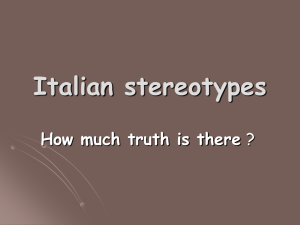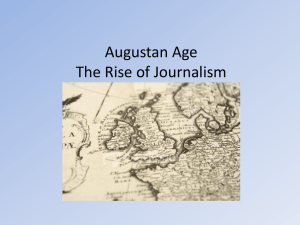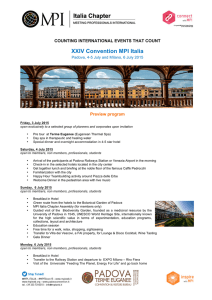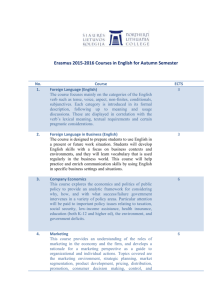Federico Caffè: l`uomo, l`insegnamento, il percorso intellettuale
advertisement
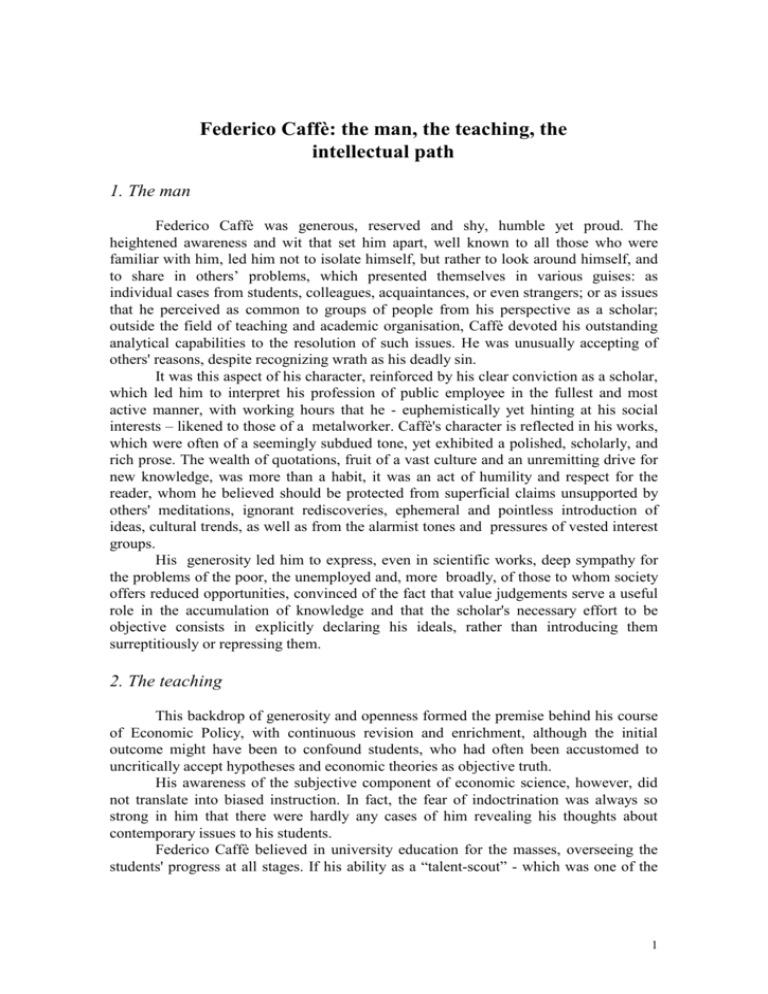
Federico Caffè: the man, the teaching, the intellectual path 1. The man Federico Caffè was generous, reserved and shy, humble yet proud. The heightened awareness and wit that set him apart, well known to all those who were familiar with him, led him not to isolate himself, but rather to look around himself, and to share in others’ problems, which presented themselves in various guises: as individual cases from students, colleagues, acquaintances, or even strangers; or as issues that he perceived as common to groups of people from his perspective as a scholar; outside the field of teaching and academic organisation, Caffè devoted his outstanding analytical capabilities to the resolution of such issues. He was unusually accepting of others' reasons, despite recognizing wrath as his deadly sin. It was this aspect of his character, reinforced by his clear conviction as a scholar, which led him to interpret his profession of public employee in the fullest and most active manner, with working hours that he - euphemistically yet hinting at his social interests – likened to those of a metalworker. Caffè's character is reflected in his works, which were often of a seemingly subdued tone, yet exhibited a polished, scholarly, and rich prose. The wealth of quotations, fruit of a vast culture and an unremitting drive for new knowledge, was more than a habit, it was an act of humility and respect for the reader, whom he believed should be protected from superficial claims unsupported by others' meditations, ignorant rediscoveries, ephemeral and pointless introduction of ideas, cultural trends, as well as from the alarmist tones and pressures of vested interest groups. His generosity led him to express, even in scientific works, deep sympathy for the problems of the poor, the unemployed and, more broadly, of those to whom society offers reduced opportunities, convinced of the fact that value judgements serve a useful role in the accumulation of knowledge and that the scholar's necessary effort to be objective consists in explicitly declaring his ideals, rather than introducing them surreptitiously or repressing them. 2. The teaching This backdrop of generosity and openness formed the premise behind his course of Economic Policy, with continuous revision and enrichment, although the initial outcome might have been to confound students, who had often been accustomed to uncritically accept hypotheses and economic theories as objective truth. His awareness of the subjective component of economic science, however, did not translate into biased instruction. In fact, the fear of indoctrination was always so strong in him that there were hardly any cases of him revealing his thoughts about contemporary issues to his students. Federico Caffè believed in university education for the masses, overseeing the students' progress at all stages. If his ability as a “talent-scout” - which was one of the 1 few things he allowed himself to be complacent of - made him appreciate the most gifted, his awareness of being able to contribute to individual and social progress led him to be helpful and considerate with others as well, especially with students from more humble beginnings – and not only in didactic terms. His teaching, however, was not limited to lecture halls, the narrow spaces of Piazza Borghese and Via Ripetta, and later to those large, but still crowded spaces of Via del Castro Laurenziano; his was a kind of permanent school, for various educational levels, which made use of a great variety of instruments, some of which, such as the translation of scientific works or production of essays for a wider audience, were meant to broaden the range of scholars and readers of economics. If for Federico Caffè it cannot be said that "the study of economics is an expression of love of one's country”, as one of his mentors was fond of saying, it is certain that he enlighteningly thought that introducing the general public to economic issues and tools was truly a "social service". A particularly noteworthy example of his work outside academia are Caffè's very successful educational activities at various trade union premises. 3. The intellectual path Federico Caffè's first essay was written in 1942 and discussed the formation of Risparmio spontaneo e forzato nel finanziamento della guerra (Spontaneous and forced savings in financing war). It was thus born of the harsh problems of the time. Subsequently, it was always concern towards contemporary problems – in particular those of the reconstruction period – to which Caffè devoted his energies, both on a professional level as an employee of the Central Bank and as an advisor of various public organisations (The Economic Assembly Commission for the Constituent, Interministerial Committee for Reconstruction, Ministry of Finance, Ministry of Foreign Trade), and on a personal level as an author of various papers and a voluntary assistant to the chair of Economic and Financial Policy. Awareness of concrete problems and open-mindedness to the most innovative contributions brought him to foster Keynesian studies and become an advocate of these new theories; this was in the early 1950's, a period in Italy where pre-Keynesian theories were the accepted norm and anti-Keynesianism was a respected profession. La teoria della maturità economica e la funzione degli investimenti pubblici (1954), (Theory of economic maturity and the function of public investments) e Politiche degli interessi e degli investimenti (1956), (Interest and investment policies), were the first fruits of these studies. Caffè's interest in concrete problems had now found a solid analytical foundation which served as a premise for the guide to action. Things had not come full circle yet however; as in the transition from political economics to economic policy, which, according to his master Gustavo Del Vecchio, constituted successive stages of a unified economic science, the analysis of the foundations of public intervention needed to be strengthened and its application criteria needed to be specified. Caffè was one of the two main proponents – along with Siro Lombardini - of the study of welfare economics, which offered him a means to discern the virtues and failures of the market at the most abstract level, for the furtherment of the public 2 agenda, which he loved to define as the logic of economic policy (Vecchi e nuovi indirizzi nelle indagini sull' economia del benessere) (1954), (Old and new addresses in investigations on welfare economics). The analysis of coherence rules and the techniques necessary to create a unified design of government policy is the last logical step of Federico Caffè's intellectual path, which began with perceiving and analysing concrete problems. This step began in 196061 as a direct and natural consequence of his studies in welfare economics, which led him to edit for didactic purposes, the Italian issue of Scienza e benessere nella politica economica (Science and welfare in economic policy) by F. Zeuthen and in so doing come into contact with the intellectual environment and programming experience of the countries of Central and Northern Europe, of which there had already been significant echoes in Ferdinando Di Fenizio's L’industria. From the early 1960's 200 scientific publications – on top of countless publicistic articles – follow in quick succession, reflecting the strong interconnection between Caffè's theoretical and empirical interests already mentioned. Practical problems – sometimes of dramatic urgency – were the object of his ongoing attention. He always viewed these from an academic's perspective who, to discover the causes, placed them in a historical context, and to resolve them he suggested relying on the wide range of economic policy tools advanced by past and present economists, albeit cautioning to differentiate carefully solutions which have been “amply experimented and very often ineffective” and to avoid being swayed by fashionable ideas and deceptive appearances. Year after year, historical studies on economic theory grow more numerous in searching, on one hand, for the roots, both near and distant, of dominant liberalistic attitudes, and on the other, for hypotheses, political and analytical tools, as theoretical frames of reference capable of providing a means of formulating an alternative economic policy plan, with the belief that “an exhaustive exploration of the box of ideas can be useful not only to comprehend that it is anything but empty, but also to avoid filling it with illusory new ideas or imitative junk.” His later years are of rudely revisiting the ideas of fundamental stability, efficiency and equity of the free market, expressed, as he says, with a formal rigour which conceals the analytical impoverishment and assumes essentially the status of a slogan, “repetition providing assurance,” with the hope of obscuring the difference between ideal capitalism and real capitalism. His refusal of neoliberal stances – which in Italy brought him to lead the “meagre remains” of an army for years, as witnessed by Giacomo Becattini – was founded on the observation that, not the excess of public intervention nor assistance, but their defectiveness or the incomplete actuation of unitary plans – not unrealistic nor intellectualistic – of governmental action should be considered responsible of less than brilliant results on the economic and social plane. His refusal of an anachronistic return to the market – result of the confusion between “sunset” and “not reached fullness of a new day” – were two constant references of Caffè: the first to the thoughts of Sidgwick and Pigou and to the already consolidated corpus of welfare economics; the second to the works of Keynes and first generation Keynesians. 3 With Keynes Caffè shared not only the theoretical frame of reference and the guidelines to public intervention on the matter of employment, but also more generally the position of heterodox developed in the “cittadella”, from which he accepts the great majority of its body of economic doctrine. With Keynes he still shares the social “philosophy”, the views on the role of the economist, and not least the intimate conviction that “ideas in the long run prevail over vested interests”. It is this belief which, beyond other substantial aspects of his teaching, he tried to transmit – sometimes succeeding painfully – to his pupils. Thereby the topic remains the responsibilities and rights of man which, for Federico Caffè, had been the focus of every cultural and practical interest. The “struggle to attenuate the multiple forms of marginalisation of human beings”, is not fruit of partisan ideas, but stems from the attention directed towards the improvement of man, every man who, amongst all else, brought him to sustain the idea of a universal welfare state, not solely for the poor, but as a tool for the well-being of all. In one work dedicated to economic programming in Italy he cites – without remotely surprising anyone acquainted even minimally with his world view – a passage from Three decades of economic and political chronicles: << The man, to be assumed as the central reference point of economic programming is what Luigi Einaudi presents us in pages which should be reread: “The man – he wrote – as a sum of spiritual and moral energies, as a force which opposes itself to nature, impoverished since centuries, to corrupting government, to torpid environment, to surrounding misery”>>. 4. The relevance of Caffè's ideas to the present day How contemporary are Caffè's ideas? Firstly one must not forget his intellectual originality, happy synthesis of ethics, history and economics, from which a world view distant from every metaphysical determinism emerged. Through the cultural path previously described, Caffè came to define in an entirely new and fruitful way, the contents and methodology of economic policy, a discipline often considered merely a technical appendage of more solid economic theory. Secondly, strictly on the plane of economic investigation, the insistent statement that it should serve as a “guide to action” meant recalling and researching useful messages in the most hidden corners of national and international economic thought, while simultaneously approaching these ideas with an eclectic attitude. He thought that, even in this way, it was possible to rediscover the necessary energy to react to the conservatives' advocacy of impracticable policies. Certainly the world and the practice of economic policy are different now from those of the 70s and 80s, the years of full maturity of his ideas. All over the world the role of the state is much different today than it was then; and in Italy the changes have been even more radical. Certainly, if the indicator of state role were given by the presence of direct intervention in the economy, his views would be entirely opposed to the mainstream. Some observations however are essential. Caffè had never been, even in the years of the complete and unquestioned triumph of certain forms of public intervention an advocate of its benefit at all costs; it is sufficient to recall his criticism against the Iri 4 formula articulated exactly in the 50s and 60s, a period of maximal development of this form of public intervention which appeared particularly alluring. Moreover, Caffè always accurately proclaimed the autonomy of thought with respect to reality, doubting strongly that this was always rational and acceptable. Lastly, contemporary economic thought may today be closer to Caffè's than it might have been in the 80s. The problems of macroeconomic stability, accentuated by market and production globalisation as well as by the deflationary policies adopted in Europe, contributed to rekindling interest in Keynes' work in recent years, in particular his fundamental contributions on the workings of financial markets. Beyond everything else, Caffè's ideas – like those of other thinkers and social scientists from whom he often drew inspiration – will remain relevant, surpassing the liberalistic intoxications and transient fashionable ideas, until the market and public intervention are capable of guaranteeing employment, social justice, and protection for the weak and disadvantaged. We can agree with him that a progressive socio-economic approach cannot prescind from an economic policy that includes, amongst its tools, conditioning controls over individual choices; which considers indispensable the objectives of egalitarianism and aid usually embodied by a state guaranteeing social welfare, and which entrusts public intervention with a fundamental role in economic conduct. (From Introduzione ai Saggi di politica economica in onore di Federico Caffè (Introduction to Essays on economic policy in honour of Federico Caffè), edited by Nicola Acocella, Guido M. Rey and Mario Tiberi; Franco Angeli, Milan, 1999, Vol. III, pp. 11-6. This Introduction has been translated by Francesca Uda). 5
